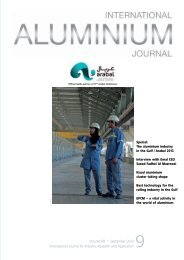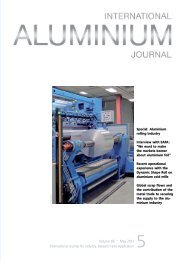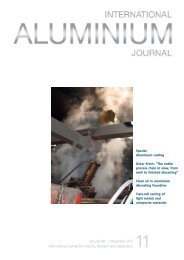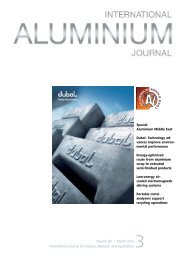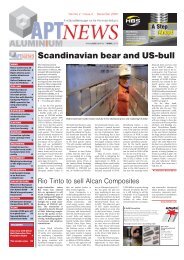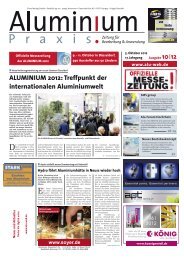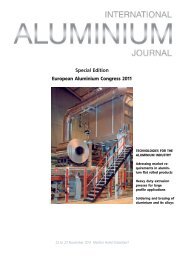special - Alu-web.de
special - Alu-web.de
special - Alu-web.de
Create successful ePaper yourself
Turn your PDF publications into a flip-book with our unique Google optimized e-Paper software.
ALUMINIUM SMELTING INDUSTRY<br />
Optimisation of grain refinement in a<br />
range of casthouse aluminium alloys<br />
M. Bryant, MQP<br />
Fig. 1: Instrumentation used in the Opticast system<br />
MQP Ltd recently presented a paper at<br />
the 2013 TMS Conference in San Antonio,<br />
Texas, about optimising the grain<br />
refining process for aluminium alloys [1].<br />
The article is based on that presentation,<br />
including some new information, and<br />
looks at<br />
• the optimisation technique used<br />
• a new powerful and consistent grain<br />
refiner, Optifine<br />
• and their combined effect on a range<br />
of aluminium alloys currently being<br />
produced at a casthouse involved in<br />
the study.<br />
Optimisation<br />
The Opticast system is proving to be an invaluable<br />
tool in carrying out assessment and control<br />
of grain refinement practice in industrial<br />
Fig. 2: Grain refiner curves for two master alloys with different efficiency<br />
casthouses by using data generated from sampling<br />
the melt in real time. Originally conceived<br />
by Lennart Backerud [2] and co-workers at<br />
Stockholm University, and since that time extensively<br />
<strong>de</strong>veloped, tested and refined, the<br />
Opticast technology is today being used for<br />
optimisation and control of grain refinement<br />
practice in casthouses worldwi<strong>de</strong>.<br />
It produces rapid and reliable results so<br />
that accurate conclusions can be quickly ma<strong>de</strong><br />
regarding implementation of optimised grain<br />
refining practice.<br />
Implementation of the Opticast system in<br />
the casthouse entails the following steps: calibration<br />
and sampling in casting furnace.<br />
Calibration involves establishing how a<br />
specific alloy responds to addition of fresh<br />
nuclei via the grain refining rod, in other<br />
words establishing the equations for the grain<br />
refinement curves as shown in Fig. 2. It shows<br />
a test carried out with<br />
two different batches of<br />
the same grain refiner<br />
in the same alloy melt.<br />
Obviously one batch<br />
is more efficient than<br />
the other and it follows<br />
that if both grain refiners<br />
are being used in a<br />
casthouse, the calibration<br />
must be done to handle<br />
any variations in the grain<br />
refiner efficiencies, that is<br />
© MQP<br />
a best and worst case scenario. This means that<br />
the calibration equation must be set up for the<br />
upper of the two curves and is for the lower<br />
one as well. The practical implication of this is<br />
that there is much to gain if the grain refiners<br />
used have a consistently high efficiency from<br />
batch to batch.<br />
Optifine<br />
Establishing that grain refiner variability is an<br />
important consi<strong>de</strong>ration factor in achieving a<br />
fully optimised practice has led to the <strong>de</strong>velopment<br />
of a consistently powerful titanium boron<br />
master alloy grain refiner, Optifine.<br />
Optifine is produced via a <strong>special</strong> production<br />
route, which substantially optimises its<br />
nucleation potential. In standard TiBAl grain<br />
refiners only 1% of particles are active, and<br />
large bori<strong>de</strong> particles and agglomerates lead<br />
to preferential formation of large grains<br />
whereas studies have shown that particles in<br />
the size range 1-3µ are optimum for nucleation.<br />
Optifine has been found to have over six<br />
times more active nuclei per ppm of boron<br />
Fig. 3: Microstructure of a standard TiBAl<br />
Fig. 4: Microstructure of Optifine<br />
40 ALUMINIUM · 7-8/2013



